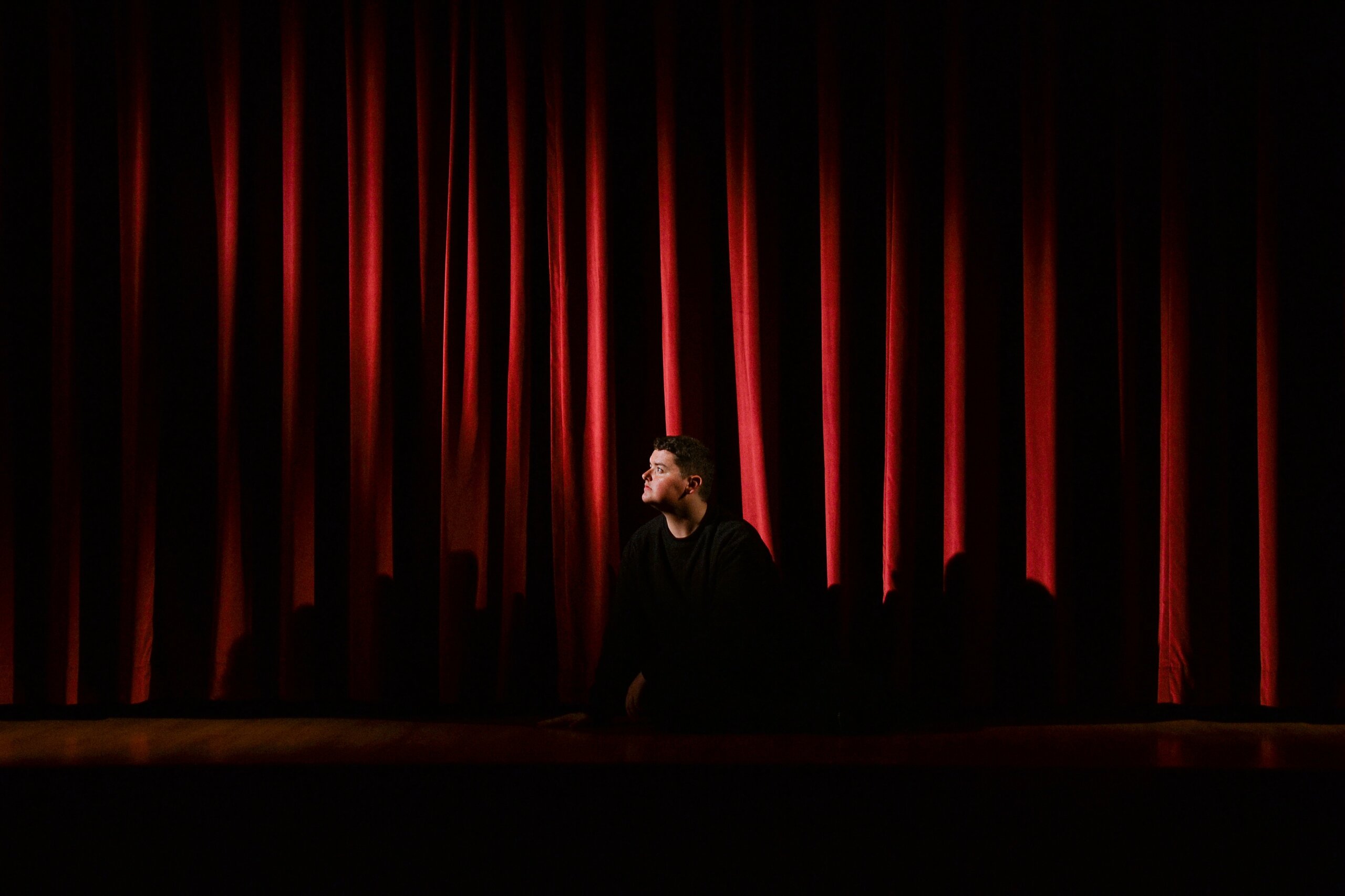
Being a great actor requires more than just reciting lines from a script. There are fundamental parts of acting that all performers must learn and master—the art of stage presence and audience connection.
The good news is that learning these important skills doesn’t require pricey acting classes or spending any money at all. Casting Frontier is here to help you master stage presence and audience connection like a pro, and these budget-friendly tips, skills and helpful techniques will help you improve stage presence naturally, and make audience connection an easy part of any actor’s practice.
The Fundamentals of How to Have Stage Presence
According to the Merriam-Webster Dictionary, the definition of stage presence is, “a quality that attracts attention on the stage.” This is a very simple, but absolutely accurate, definition.
An actor on stage wants the audience to be captivated by their performance, watching them with an unwavering dedication. Laser-focused. Riveted to their seats. Moved by emotion through each scene. Stage presence isn’t something that comes naturally to all performers, but it truly matters in live theater to keep an audience captivated by an actor’s every move and line.
In looking at how to have stage presence, if it doesn’t come naturally to an actor, it can be developed with practice. Building the best stage presence is all about comfort within your own body and having the right voice that commands attention.
In learning how to improve stage presence, we suggest actors focus on the following tips:
Body language and posture are very important. Confident body language isn’t fidgety. Be centered, with ease throughout your body. Your posture needs to be strong. Take advantage of having a full and upright spine, shoulders back and neck straight. You don’t want to appear awkward or nervous when on stage.
Understand that enhanced confidence and charisma will come to you with each new production you participate in. The more parts you get, the more confident you will be in your performance and the ability to captivate a crowd.
When working on different characters on stage, you’ll develop a connection with each of the characters you will play, and you’ll eventually be able to pull off just about any part you want. The best actors can walk onto any stage and immediately have the audience interested in everything they do. They inhabit a character almost like a second skin. And it’s that connection that will help to make any performance a stronger one on stage.
How to Connect with Your Audience
The connection between an actor and the audience is one of the most crucial parts of live theater. It’s vital for the actor to connect with everyone watching to make sure that the performance is coming off as real and authentic.
In looking at what an audience connection definition really is, it can be hard to define. Just look at some of the greatest actors to ever take the stage, like Hugh Jackman, Viola Davis or Nathan Lane. Each of these actors has audience connection skills that keep people coming to see their shows again and again.
Here are some audience connection tips that any actor can use right away on stage:
Have the right eye contact and engagement. That means with other actors on stage, or when doing a monologue, making genuine eye contact with members of the audience. This will bring people into your performance, making them care about the character you are playing.
Maintaining emotional authenticity is another important tip when trying to connect with your audience. People will be able to feel deep inside whether or not you are authentically inhabiting your character.
Another tip to remember is your interaction with the space on stage. When you are at ease and commanding the stage, it’s going to resonate with the audience, making them feel a better connection to the role you are playing. Keep in mind that the actor-audience relationship in theater can make or break a production.
Practical Techniques to Improve Stage Presence and Audience Connection
Some specific skills and exercises can enhance your stage presence and audience connection.
Here are some of the best ones to use in an actor’s daily life to help improve stage presence, and will allow you to connect with ease to any audience:
Technique #1: Daily Breathing Exercises
Practicing proper breathing is important on stage. It allows for more ease when performing with better pacing when an actor is saying their lines.
Develop a practice routine of breathing exercises on a daily basis, like the “4-7-8” breathing method. The way to start it requires you to breathe in for 4 seconds, hold for 7 seconds, and then exhale with a “whooshing” sound for 8 seconds. You can repeat this cycle around 3 times for the best results.
Technique #2: Do Vocal Projection Work
One of the best things an actor has to work with on stage is their voice. Doing proper vocal projection work requires that you are breathing properly, deep within your diaphragm, to be able to project the voice in a large space.
Make sure you warm up your voice, stretch your body and breathe deeply before trying to get your voice to be as big and loud as it needs to be naturally. Ideally, you want to be sure that the audience members in the last row of the theater can hear you as well as the ones in the front.
Technique #3: Be Mindful of the Stage Space
Another technique is being mindful of your space on stage. Make sure that you are aware and comfortable with your blocking so that you are more at ease with your body. The right spatial awareness can help an actor move more effectively. Know the stage props well, how the lighting works and the proportions of the stage. All of this will help to improve your overall stage presence during any live theater production.
Technique #4: Enlist a Meditation Practice
Having stage fright or anxiety when performing can kill stage presence or your connection to the audience, and having a meditation practice can help all performers to be more calm on stage. Sitting quietly, focusing on breathing, and doing this daily for at least 15 to 20 minutes can help you feel more centered and calm in your own body, and more at home on any stage.
Technique #5: Rehearsing
Even when you aren’t rehearsing with your cast, it’s possible to practice some rehearsal techniques on your own. Having warm-up rehearsal practices can help to improve stage presence. For example, a great vocal warm-up that you can do is a tongue twister. It requires you to say something like “red leather, yellow leather” over and over to warm up your mouth and loosen up. Memorize a few of these to use before getting ready for a show.
The Role of Training in Enhancing These Skills
The more an actor performs on stage in productions, the better their skills will be. But there are also acting classes and workshops that can help to improve these skills, and not all of them require a ton of money to take. You can find local classes, sometimes at community colleges, that are quite affordable, or even free.
You can also check with local community theater groups around town—many offer budget-friendly classes and workshops with professionals who can help you with your craft.
The local library is also a great resource. You can check out books on acting with tips from some of the greatest acting teachers of all time, like Stanislavsky, Lee Strasberg or Sanford Meisner. You can find free online acting tutorials through YouTube or actors’ websites, and podcasts are another fun way to get tips and techniques from real actors who have had success on stage and in film.
Key Takeaways to Improve Stage Presence and Audience Connection
- Stage presence and audience connection are critical for actors.
- Body language, confidence and character connection will improve these skills.
- The actor-audience connection happens through eye contact, authenticity and interaction.
- Practical exercises and training resources can enhance an actor’s stage presence.
- Find budget-friendly or free options to improve your acting abilities.
Being a great actor does require hard work and dedication. It may seem like the process comes naturally to some more than others, but it really means that the actor has dedicated time to improving their skills. They understand the value of having a dynamic stage presence and audience connection.
At Casting Frontier, we encourage you as an actor to explore how to master these parts of your practice, so that you’ll have a command of the stage that is impressive and unique. Explore all the opportunities that Casting Frontier has to offer with auditions and casting calls, and use your newfound dynamic skills as a master of stage presence and audience connection to be the actor you’ve always wanted to be.
You may also like:
- Acting Coach Amy Lyndon Shares ‘Lyndon Technique’ Tips and More
- Mastering Ensemble Acting: The Power of Collaborative Performance
- Mastering Authenticity: A Guide to Captivating Audiences and Landing Dream Roles
Written by Keely Reising




